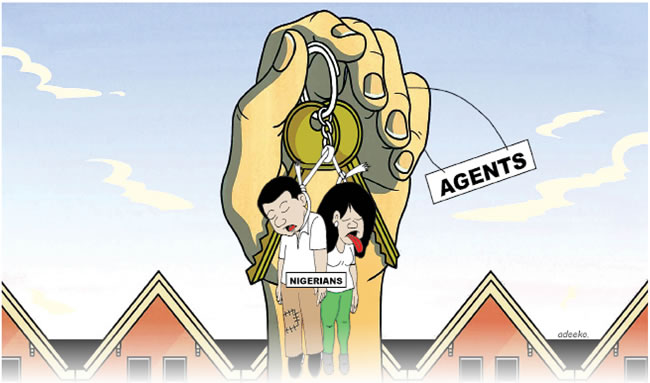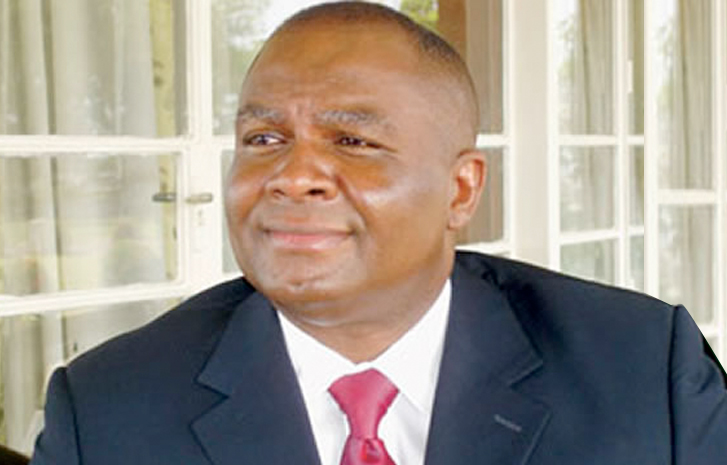No sweet home for some Nigerians
Homelessness and the high cost of housing are salient issues plaguing the country. ADEOLA OTEMADE talks with people and experts about the responsible factors and the exit of the poor masses.
The intense heat didn't stop Saidat (pseudonym) from chasing cars and commercial buses to sell sachet water. She passed passing vehicles while a toddler was strapped to her back and another ran behind her.
Moments later, she went to sit on the pavement where most beggars sit at the popular roundabout in Mokola, Ibadan, with her two children. The sachet of water in a sachet that she was selling stood at her feet; next to her was also a tattered Ghana-Must-Go bag, and nothing more. She lowered the child strapped to her back to suckle while the other child watched.
Looking tired, sad and hopeless, the 33-year-old recounted the ordeal of how she became homeless when approached by the Sunday Tribune. According to her, she was forced to leave her accommodation because she could no longer afford to pay. Her husband (now deceased) was a cobbler, while she sold small things in addition to their rental apartment.
Her husband, she told the Sunday Tribune, died in 2018 after a brief illness. "I stayed with my two children," recalls Saidat. “While he was alive, we both took care of them with the little we earned. We lived at the end of the street in one of these houses to your right (pointing to a particular building near a gas station).
"After my husband died, the landlord asked us to leave saying he had sold the house. The rent for my house was N2,000 per month, or N24,000 per year. I couldn't pay the rent for three years because my small business wasn't going anywhere.When I couldn't pay the landlord made the excuse that he had sold the house, which I knew was wrong.
“I thought about renting another place, but the rent for the house was too high. My extended family members are not staying in Ibadan and I don't want to go home. to stay below decks for a while until I could scrape together some money to rent a suitable place. So I decided to seek shelter below decks here; I packed up some things and came here with my children. We started staying under the bridge since last December. I met people here too who come to sleep at night and leave in the morning to get their daily bread,” she said.
>Olorunfemi Olugbenga, a storekeeper in an electronics company, unlike Saidat, is lucky. He has his older brother as his saving grace. According to him, he would have become homeless, as he has been unemployed for three years.
"I'm in my thirties and I still live with my brother, but if it wasn't for my older brother asking me to stay with him, I might not be here today. I have been unemployed for three years before finding one. Due to the state of the nation, I am unable to make the bold choice that a guy my age should have his own house and be settled now.
>"When I got my current job recently, I tried to rent a place for myself, but I couldn't. House rents are now high; even renting a room now is something else. The houses I saw have old toilets and bathrooms. Opting for houses around Oluyole, Bodija Estate, Akala Estate and others with low income salary is a crazy dream.
"Most of the time I think about the number of people who are homeless due to their inability to afford housing. The Nigerian government seems to ignore the serious problem of homelessness, and bridging the gap between wealth and poverty,” he lamented.
Saidat and Olugbenga are just two of many Nigerians who face housing challenges in the country amid low income, socio-economic challenges and insecurity.
With an urbanization rate of 4.78%, Nigeria has the largest housing deficit in Africa, totaling 17 million units, according to a study by the Federal Ministry of Housing. The report said living conditions were poor, as about 85 percent of urban residents live in single rooms, often with eight to twelve people per room. Only about 27% of urban residents had access to piped water in 1996. In 2021, according to the report, only 10% of urban residents had indoor toilets, and little has improved since then.
Stagnant economy, rising cost of living
A landlord who spoke to the Sunday Tribune on condition of anonymity claimed that as inflation has affected all sectors of the economy, more people are facing the possibility of becoming homeless as they cannot continue to pay for their current place of residence, nor are they able to finance their own home.
According to him, inflation has had an impact on all sectors of the economy and...

Homelessness and the high cost of housing are salient issues plaguing the country. ADEOLA OTEMADE talks with people and experts about the responsible factors and the exit of the poor masses.
The intense heat didn't stop Saidat (pseudonym) from chasing cars and commercial buses to sell sachet water. She passed passing vehicles while a toddler was strapped to her back and another ran behind her.
Moments later, she went to sit on the pavement where most beggars sit at the popular roundabout in Mokola, Ibadan, with her two children. The sachet of water in a sachet that she was selling stood at her feet; next to her was also a tattered Ghana-Must-Go bag, and nothing more. She lowered the child strapped to her back to suckle while the other child watched.
Looking tired, sad and hopeless, the 33-year-old recounted the ordeal of how she became homeless when approached by the Sunday Tribune. According to her, she was forced to leave her accommodation because she could no longer afford to pay. Her husband (now deceased) was a cobbler, while she sold small things in addition to their rental apartment.
Her husband, she told the Sunday Tribune, died in 2018 after a brief illness. "I stayed with my two children," recalls Saidat. “While he was alive, we both took care of them with the little we earned. We lived at the end of the street in one of these houses to your right (pointing to a particular building near a gas station).
"After my husband died, the landlord asked us to leave saying he had sold the house. The rent for my house was N2,000 per month, or N24,000 per year. I couldn't pay the rent for three years because my small business wasn't going anywhere.When I couldn't pay the landlord made the excuse that he had sold the house, which I knew was wrong.
“I thought about renting another place, but the rent for the house was too high. My extended family members are not staying in Ibadan and I don't want to go home. to stay below decks for a while until I could scrape together some money to rent a suitable place. So I decided to seek shelter below decks here; I packed up some things and came here with my children. We started staying under the bridge since last December. I met people here too who come to sleep at night and leave in the morning to get their daily bread,” she said.
>Olorunfemi Olugbenga, a storekeeper in an electronics company, unlike Saidat, is lucky. He has his older brother as his saving grace. According to him, he would have become homeless, as he has been unemployed for three years.
"I'm in my thirties and I still live with my brother, but if it wasn't for my older brother asking me to stay with him, I might not be here today. I have been unemployed for three years before finding one. Due to the state of the nation, I am unable to make the bold choice that a guy my age should have his own house and be settled now.
>"When I got my current job recently, I tried to rent a place for myself, but I couldn't. House rents are now high; even renting a room now is something else. The houses I saw have old toilets and bathrooms. Opting for houses around Oluyole, Bodija Estate, Akala Estate and others with low income salary is a crazy dream.
"Most of the time I think about the number of people who are homeless due to their inability to afford housing. The Nigerian government seems to ignore the serious problem of homelessness, and bridging the gap between wealth and poverty,” he lamented.
Saidat and Olugbenga are just two of many Nigerians who face housing challenges in the country amid low income, socio-economic challenges and insecurity.
With an urbanization rate of 4.78%, Nigeria has the largest housing deficit in Africa, totaling 17 million units, according to a study by the Federal Ministry of Housing. The report said living conditions were poor, as about 85 percent of urban residents live in single rooms, often with eight to twelve people per room. Only about 27% of urban residents had access to piped water in 1996. In 2021, according to the report, only 10% of urban residents had indoor toilets, and little has improved since then.
Stagnant economy, rising cost of living
A landlord who spoke to the Sunday Tribune on condition of anonymity claimed that as inflation has affected all sectors of the economy, more people are facing the possibility of becoming homeless as they cannot continue to pay for their current place of residence, nor are they able to finance their own home.
According to him, inflation has had an impact on all sectors of the economy and...
What's Your Reaction?






















